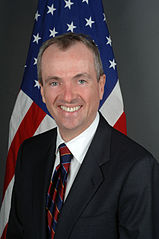April 24, 2023 •
New Jersey Governor Phil Murphy Sued over Campaign Finance Changes
Jeff Brindle, Director of New Jersey’s Election Enforcement Commission, has sued Gov. Murphy to block the recently signed Elections Transparency Act. The new law allows the governor to directly appoint the four members of the Election Enforcement Commission without Senate […]
Jeff Brindle, Director of New Jersey’s Election Enforcement Commission, has sued Gov. Murphy to block the recently signed Elections Transparency Act.
The new law allows the governor to directly appoint the four members of the Election Enforcement Commission without Senate oversight if within a 90-day period.
The new law also reduces the time the commission has to investigate campaign finance violations from 10 years down to two years following a violation.
The timeline change applies retroactively, effectively wiping out the majority of the commission’s caseload.
Brindle believes the new law and calls for his resignation are in response to his efforts against dark money in New Jersey’s politics.
The three other members of the Election Enforcement Commission resigned in protest two days after the new law was passed.
May 20, 2019 •
New Jersey Dark Money Disclosure Bill Vetoed
Gov. Phil Murphy conditionally vetoed legislation requiring dark money groups spending money to influence elections in New Jersey to disclose their large donors. Senate Bill 1500, carried over from last year’s session, requires disclosure of contributors giving more than $10,000 […]
Gov. Phil Murphy conditionally vetoed legislation requiring dark money groups spending money to influence elections in New Jersey to disclose their large donors.
Senate Bill 1500, carried over from last year’s session, requires disclosure of contributors giving more than $10,000 to 501(c)(4) groups engaging in political activities and lobbying.
In issuing the veto, Gov. Murphy said the bill contained loopholes and inconsistent disclosure standards.
He also expressed concern about the legislation not passing judicial scrutiny because of broad disclosure requirements beyond spending in elections for groups involved in issue campaigns.
The veto went on to recommend requiring companies receiving large scale tax credits from the state to disclose public contracts and political contributions to the New Jersey Election Law Enforcement Commission (ELEC).
The recommendation also sought to strike a provision limiting elected officials from managing dark-money groups.
Supporters of Senate Bill 1500, which overwhelmingly passed both houses, argued the legislation leveled the playing field by requiring all groups to disclose if trying to sway elections, legislation, or policy.
The legislature can attempt an override of the governor’s veto or work towards amending the bill based on the governor’s recommendations.
Senate Bill 1500 has made it Gov. Phil Murphy’s desk after being introduced in early 2018. The bill requires committees to report contributions in excess of $10,000 and expenditures in excess of $3,000 to the Election Law Enforcement Commission. Additionally, […]
 Senate Bill 1500 has made it Gov. Phil Murphy’s desk after being introduced in early 2018.
Senate Bill 1500 has made it Gov. Phil Murphy’s desk after being introduced in early 2018.
The bill requires committees to report contributions in excess of $10,000 and expenditures in excess of $3,000 to the Election Law Enforcement Commission.
Additionally, when the contributor is an individual giving more than $10,000, the committee must disclose the occupation of the individual and the name and mailing address of the individual’s employer.
If signed by the governor, the bill will impact the January 15, 2020, independent expenditure report.
January 26, 2018 •
New Jersey Governor Signs Code of Conduct Executive Order for Self, Future Governors
New Jersey Gov. Phil Murphy signed Executive Order 2A, which places limits on gifts and defines personal relationships for the governor of the Garden State. This order requires the governor to disclose gifts received from anyone he has met in […]
 New Jersey Gov. Phil Murphy signed Executive Order 2A, which places limits on gifts and defines personal relationships for the governor of the Garden State.
New Jersey Gov. Phil Murphy signed Executive Order 2A, which places limits on gifts and defines personal relationships for the governor of the Garden State.
This order requires the governor to disclose gifts received from anyone he has met in the past three years before being inaugurated.
“Anyone we’ve met since then is going to be subject to complete disclosure above the threshold of whatever the gift levels are,” said Murphy.
Any relationship established before then is considered pre-existing and is exempt from the order.
The executive order puts New Jersey in line with federal standards.
November 8, 2017 •
Democrat Phil Murphy is New Jersey’s Next Governor
Democrat Phil Murphy was elected as New Jersey’s 56th governor. Murphy, a former Goldman Sachs executive and U.S. Ambassador to Germany, may impact Congress if he appoints a replacement for U.S. Sen. Robert Menendez. Menendez is currently on trial for […]
 Democrat Phil Murphy was elected as New Jersey’s 56th governor.
Democrat Phil Murphy was elected as New Jersey’s 56th governor.
Murphy, a former Goldman Sachs executive and U.S. Ambassador to Germany, may impact Congress if he appoints a replacement for U.S. Sen. Robert Menendez.
Menendez is currently on trial for corruption charges and the jury began deliberations on November 6, 2017. If convicted, Menendez will face pressure to step down allowing a Democrat, opposed to exiting Republican Gov. Chris Christie, to appoint a replacement.
Murphy is set to take office on January 16, 2018.
State and Federal Communications, Inc. provides research and consulting services for government relations professionals on lobbying laws, procurement lobbying laws, political contribution laws in the United States and Canada. Learn more by visiting stateandfed.com.

